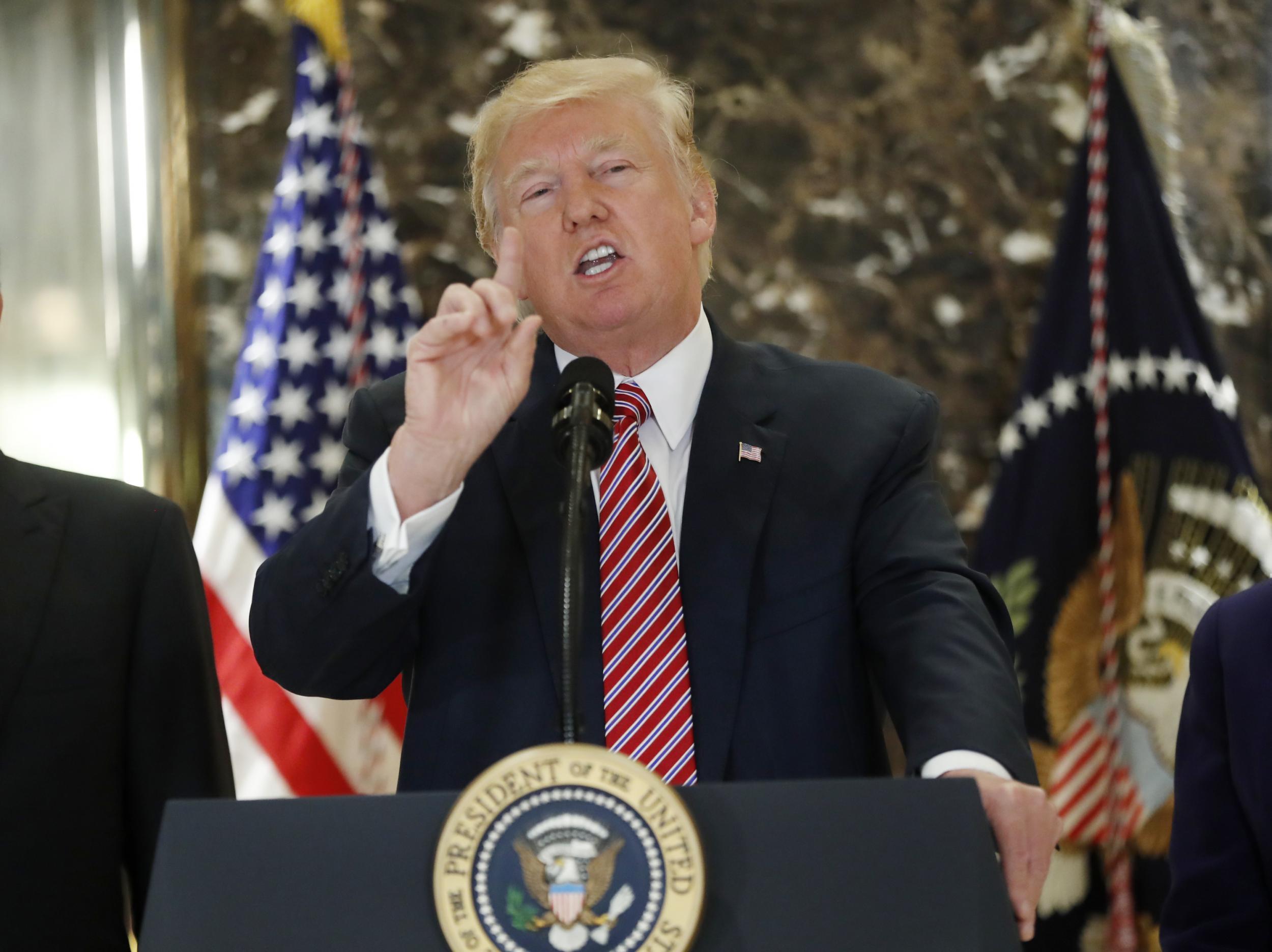Charlottesville: Donald Trump defends 'excellent' first comments
'When I make a statement, I like to be correct. I want the facts,' Mr Trump says

Your support helps us to tell the story
From reproductive rights to climate change to Big Tech, The Independent is on the ground when the story is developing. Whether it's investigating the financials of Elon Musk's pro-Trump PAC or producing our latest documentary, 'The A Word', which shines a light on the American women fighting for reproductive rights, we know how important it is to parse out the facts from the messaging.
At such a critical moment in US history, we need reporters on the ground. Your donation allows us to keep sending journalists to speak to both sides of the story.
The Independent is trusted by Americans across the entire political spectrum. And unlike many other quality news outlets, we choose not to lock Americans out of our reporting and analysis with paywalls. We believe quality journalism should be available to everyone, paid for by those who can afford it.
Your support makes all the difference.President Donald Trump has defended the timing of his "excellent" statements on the white supremacist rally in Charlottesville, Virginia.
The President – who had labelled the London Bridge attack an act of terrorism even before the British authorities – said he waited to condemn white nationalist protestors because he needed "the facts"
"When I make a statement, I like to be correct. I want the facts," he told reporters assembled at Trump Tower.
Democrats and Republicans alike had criticised the President for failing to explicitly condemn the KKK and other white supremacist groups over the weekend. When he did call out these groups by name – in scripted remarks from the White House Diplomacy Room – it was three days after the protests began.
Standing behind a podium embossed with the White House seal on Tuesday, Mr Trump removed a copy of his previous remarks from his jacket pocket and began reading them aloud – eliminating his controversial comments about violence and hatred "on both sides".
"Honestly, if the press were not fake, and if it were honest, the press would have said what I said was very nice," he said, adding that the mother of a young woman who died at the rally had thanked him for his comments.
"Making the statement when I made the statement, it was excellent," he said.
The President's handling of the situation over the weekend drove three prominent business leaders to step down from his manufacturing advisory council. It drove fellow Republicans – such as Senators Tim Scott, Orrin Hatch, Marco Rubio, Ted Cruz and Cory Gardner – to rebuke his initial statement. And it drove white nationalists, posting on the Daily Stormer website, to celebrate his tepid comments.
Mr Trump, however, appeared convinced that the negative reaction stemmed from inside the "fake news" media.
"I watched [the protests] very closely - much more closely than you people watched it," he told reporters on Tuesday. "And you had a group on one side that was bad, and you had a group on the other side that was also very violent. And nobody wants to say that, but I'll say it right now."
The protests in question started when white nationalists, alt-right activists, and others poured into Charlottesville, Virginia to protest the removal of a Confederate monument. On Friday night, protestors marched on the University of Virginia campus, carrying tiki torches, some of them shouting "Jews will not replace us".
By Saturday, the group had started clashing with counter-protestors. Local officials declared the rally an "unlawful assembly," and attempted to disperse the crowds. Virginia Governor Terry McAuliffe declared a state of emergency.
Later that day, police say, a man reported to be a Nazi sympathiser drove through a crowd of counter-protestors, injuring dozens and killing one – 32-year-old Heather Heyer.
Mr Trump on Tuesday called her death a "horrible, horrible thing," but refused to label it an act of terrorism.
“I think the driver of the car is a disgrace to himself, his family, and his country," he said. "You can call this terrorism, you can call it murder, you can call it whatever you want.”
The Justice Department has opened a civil rights investigation into her death. The last post on her Facebook page before she died read: "If you're not outraged, you're not paying attention."
Join our commenting forum
Join thought-provoking conversations, follow other Independent readers and see their replies
Comments